Bali Usada - a week of Tapa Brata with Merta Ada
Bali Usada Indonesian
(Bahasa Indonesia) ----
Bali Usada English ---
page for the March 2018 retreat
Read this article in Bahasa Indonesia
Vipassana retreats in
Bali
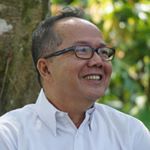 Merta Ada - more photos below Merta Ada - more photos below
4-04-18 - March 25 through 31st I attended a meditation retreat at Bali
Usada's Forest Island in scenic Tabanan,
Bali. We did Usada meditation with emphasis on healing all
types of ailments of body and mind. Healing is big in Bali and I've
noticed meditation and healing tend to go together here in general.
Usada means healing. I'd done Vipassana retreats led by Myanmar monks at
Brahmavihara Arama, a
temple up north near Lovina. This year friends Chris, owner of the
nearby Power of Now yoga studio and Bhikku Moneyya, a Myanmar trained
monk from the States, urged me to go to Forest Island for a change,
especially to hear founding teacher Merta Ada's talks. Chris would
attend but Moneyya, who usually lives there, had some visa business to
attend to.
I live in Sanur and went at times to the Bali Usada's Sanur center
Monday evening meditation. It was nice to get out and sit with about
twenty others for a change. I'd never been to a sitting with audio video
before, all Indonesian which was mainly too hard for me to follow. But I
wasn't really interested in guided meditation anyway and it was sort of
hypnotic and pleasant. There was a lot of "Semoga semua hidup
berbahagia" which I understood - May all beings be happy. Chris and
Moneyya assured me that after the week retreat in English I'd be more
appreciative. So the next time there I signed up and paid the fee -
about $330.
One nice perk was that they provide transportation.
Eight of us left in a long passenger van at 2pm Sunday. A hour and
twenty minutes of narrow, busy Bali roads later we turned onto a lane
more narrow. Had to back out to let an ongoing car exit. Then straight
ahead, through an open gate, down a steep brick incline, cross a bridge
over a jungled creek way below, then back up up again into Forest
Island. Surrounded by walls of lush greenery - thus the forest part of
the name - and almost an island being on a pie shaped piece of property
where two deep-set creeks meet. I looked around. Attractive, simple
wooden buildings, trees, lawn, paths. Walked around. Not a large place.
At the other end a few brick home-like buildings with porches.
I was surprised when Moneyya greeted me. He'd decided
at the last minute to go. Dewi, whom I knew from the Sanur center, got
me signed in. She showed me a nice little room in the dorm next to the
dining hall. I wouldn't have a roommate. Good mattress, sheets, and
pillows. Men and women in the dorm. Western toilets with sprayers. I'm
sold on toilets with sprayers which are for cleaning ones bum as the
Aussies call it.
We had dinner, our last dinner, and an orientation in
the meditation hall where we met Michael Schueber who was the master of
meditation ceremonies. He's been with Merta Ada for ten years and
explained everything clearly with only the slightest German accent. We
turned in our phones and valuables and began the noble silence - no
talking, reading, writing, smoking, or alcohol. Laminated cards labeling
the bearer as following noble silence rules were handed out. They had
cords for hanging around the neck. I didn't because I was already wearing a
rakusu (bib-like garment signifying ordination, a miniature of Buddha's
robe) and I can't put anything on top of a rakusu. Under the rakusu was
a grey linen kimono I'd just had made for the occasion. Also had what's
left of my head hair cut even shorter.
We watched an introductory video with Merta Ada and
learned the few guidelines for the meditation hall. In addition to the
aforementioned noble silence rules, while in the meditation hall , we
were not to lean on anything or lie down - if you have some special need
then talk to Michael. Not to eat or drink - if you have to drink some
water then leave the hall to do so. Not to make distracting sounds -
coughing is okay unless you get on long jags then better to go sit
elsewhere. Try to sit without moving- if you get into involuntary
distracting movements then better to sit elsewhere. Important not to
stick your feet out in front of you with the bottoms exposed - that's a
general rule for a lot of Asia. Continue all medication except pain
killers which can interfere with meditation - Usada meditation
focuses on healing and dealing with pain. Special emphasis was put on
not discontinuing medications for mental problems like schizophrenia and
bi-polar disorder.
Every sitting period was introduced first by Michael
who might also answer a question written on a pad outside to be handed
to him by Suardika who was always around taking care of details like
hitting three bells for wake up (repeatedly), one for meals, and two to
go to the meditation hall. The length of the sittings was listed as
forty-five minutes but often they'd run to an hour or so because of the
introductions and teachings beforehand. There were gentle physical
exercises rooted in the origins of Shaolin martial arts and Indonesian
dance. There was no walking meditation per se but between meditation
periods fifteen minute breaks in which people could do anything they
wanted - go get a drink, use the toilet, yoga, rest, or walk. I'm so
programmed - would stay in the hall or by the hall and do walking
meditation.
Merta's nephew Hendra took care of the audio visual
end of things and did a flawless job. Good sound system and building
acoustics.
With the noble silence, there is no discernible
friction between people. Also very little policing. Michael said they'll
come wake you or whatever if you don't show up and there were some
reminders of the importance of following the noble silence though I
never heard a word except those hushed tones allowed with the managers
and teacher. Basically all the rules were followed but I'd see some of
them get broken without any gendarmes rushing to set things right. There
was no uptightness at all.
The food was good wholesome Indonesian fare. A little
too much oil for some people but less than the norm around here. Two
breakfasts! After the first sitting there was a light fruit bowl to
which one could add some granola and yogurt. Then after a special Usada
exercise period there was a regular breakfast. Coconut water was
available during one of the mid-morning breaks. All meals included red
rice which is like brown rice but not brown. Vegan except for that
optional few spoonfuls of morning yogurt and powdered milk for coffee
and tea. Vipassana retreats traditionally include no meal after noon but
we had a light snack at five.
Forest Island is not a temple and Bali Usada is not a
religion. There are some Hindu statues around - and a Bo
tree descended from the original that Buddha sat under. But there are no
statues, altars, candles, incense or anything indicating a particular
religion in the buildings. People from various religions are welcome and
attend. Merta would mention times in the schedule to include prayers,
"if you're religious." He'd bring up science, studies, research,
genetics and inheritance.
The retreat was called Tapa Brata One. Tapa Brata
means ascetic practice - a time of limits and focus. It was a course in
the nature of body and mind as taught by Merta Ada. He divides it up
into body, mind, and memory, the later being the cause of a lot of our
troubles and the focus for a good deal of healing. I was intrigued by
that list of three and saw memory as including thought and a lot of
emotion and - and I didn't know where to stop. It seemed to me like
there's memory and there's the here and now. Still digesting that.
This was the 763rd time the course had been taught in
the last twenty-five years. Each period has an assigned audio or video
narration. There was considerable live contribution from Merta in talks
and introductions to the meditation periods. On Tuesday he arrived as he
does for every retreat, Monday being a day in Sanur for him. He gave a
live talk Tuesday evening and now and then for the rest of the retreat.
He saw everyone individually on Wednesday and Thursday. One could talk
with him about any problems or observations. He'd also do what he calls
scanning, looking into the person's body-mind to evaluate a problem
they've brought to him.
Chris and Moneyya were right - his talks were good.
Most pleasant, charming, a humorous edge, a humble man and wise with an
obvious gift to help people alleviate mental and physical pain. He just
walks into and leaves the meditation hall with everyone else. He's got
no title, no special garments though he tends to wear white shirts
(which he pointed out in jest likens him to doctors and scientists). His
talks were full of examples and stories. A lot of healing stories. His
English is good and very easy to understand which is not always true
with non native speakers or even native speakers. He makes grammatical
errors but not the sort that interfere with comprehension. Always the
right word or a word that conveys the meaning but not necessarily in the
right form. I only remember him using one word wrong in the week - and
he did it on the fifteen years old video and live to us - using
apologize to mean forgive.
Usada meditation is traditional,
following the breath going in and out of the nostrils without any
attempt to change it - just watch. I'm used to following the breath with
concentration on the abdomen both in zazen, Zen meditation, and in the
Theravada Mahasi method. And Merta did talk about focusing harmonious
mind below the navel, an area which he called the tantien, the Chinese
name like the Japanese tanden or hara. I'm used to thinking of it as the
center of gravity of the body. But I found it didn't make any difference
- as if the nose, abdomen, and breath were all in the same place. After meditation, while still
sitting, there's a brief exercise rotating the hands on the left, then
the right, then in the middle. Merta says he modeled that sequence after
what he'd observed of traditional dance all over Indonesia. And he said
they're joyous so be joyous when you do it.
Merta describes four bodies: the gross body (what most
think of as the body), meridian body (Chinese medicine - pulses,
acupuncture points), chakra body (from India - seven focal points from
crown to base), and mental body. What he calls healers includes those
who read pulses and prescribed herbs. But it also includes those who
scan the body as he does. To me it seemed he scanned the
body/mind/memory. He also dispenses herbal distillates but that hardly
came up at the retreat. And he does not discourage people from seeing
doctors.
Merta's last talk was about his life and how he came
to found Bali Usada. He was born in 1957 in a Chinese Buddhist family
and contracted polio as a child which greatly affected his ability to
walk and do sports. He was partly named after Zhou Enlai, the first
Premier of the People's Republic of China. He made a brief reference to
the persecution of communists (read Chinese) in Bali happening when his
family moved from a small village to Denpasar in 1965 but gave no
indication of how deadly it was - especially in Bali. No matter where he
lived, there was always a great healer next door whom he attached to and
learned from. I felt like he was born with a gift that attracted them to
each other. When one of them told him that to become a healer he needed
to sit still for an hour a day, he thought they were joking. Then by
chance he met Bhante Girirakkhito Mahathera, the great Vipassana guru,
who visited with Merta's uncle on the neighboring island of Lombok where
Merta lived for three years. He started meditating and went from the
worst student to the best. Merta's family went from humble means to
wealth due to a dress his mother embroidered for an Australian friend of
his big sister. A family garment industry resulted. His brother's tragic
death years later led Merta to deepen his relationship with Girirakkhito
and understanding of Buddhism.
When he began to see into people and get readings on
their maladies, he started testing it out on employees and giving them
herbs to deal with their conditions. He must have learned a lot about
herbal medicine growing up around those healers but it seemed from what
he said that he didn't rely on that but would match the vibration he
perceived of the herb with that of the malady of the employee to
determine what to give them. It all was working quite well but after a
time they'd come back for more which meant that they hadn't been cured.
He realized he needed to teach people to heal themselves and not depend
on him. So he took a break for some months and when he resumed the
healing practice included meditation with an emphasis on loving
kindness.
Merta teaches awareness of the body from head to foot
and back, to develop harmonious mind in ones meditation, to focus
harmonious mind to deal with physical and mental problems. He emphasizes
the importance of recognizing anicca, impermanence, which awakens
wisdom. There was no chanting or ceremony at the retreat except
he'd end the periods with "May all beings be happy" three times and
about midway through the week that would follow his lyrical recitation
about anicca - in Pali I think. He tended not to call anicca
impermanence though, rather he used "in process." Everything is always
changing, in process. He has a positive approach in general and I saw
his emphasis of everything being in process as emblematic, a positive
way to express the negative impermanence. He encouraged us to bring this
practice into daily life as much as we could, saying we could meditate
for five minutes or one minute when the opportunity arose. He suggested
at least thirty minutes of meditation daily, later forty, an hour even
better. Another time he said twice a day would be good and a retreat
once a year. All very much like what my Buddhist teachers have advised.
One distinctive feature of the retreat was that the
noble silence ended on Friday before lunch so that we had a full day for
transition. We could talk with each other and Merta and Michael and
write and make phone calls. Merta had us break the silence in the
meditation hall before Friday lunch by going around and introducing
ourselves. There were eleven males and fifteen females. Four or five of
the men were from France. There were some Indonesians, Germans,
Australians, a couple of Canadians, English, and a Russian woman.
Moneyya and I were the only Yanks. After that the meditation hall was to
remain the one place for noble silence.
The next day the schedule started off the same but
after breakfast there was a sitting around the Bo tree follow by photos.
As a transitional gesture, I'd stopped wearing my robe but Merta had me
go put it back on for the photos. I was relieved because during
meditation Hendra had been going around taking photos and I was going,
Oh heck I should be in my robe for this. For the group photo Moneyya was
on one side of Merta and I on the other and afterwards people took turns
having photos taken with us three and then just with Moneyya and me. I
felt like Michael should be in it instead, that I'd been mistaken for
someone else, but we both enjoyed it. Decades of hard practice finally
had paid off in our brief moment of fame.
The final event was Sharing. Merta encouraged people
to do so and said if we could think of nothing to say, we could sing a
song. Six of us had raised our hands that we'd share something for ten
minutes. A guy from Sumatra started off by saying he had a great fear of
speaking in public and then had us all laughing at ten minutes of stand
up comedy filled with references to snakes, lizards, and ants. A woman
from Germany said that she'd had chronic lower back pain for a couple of
decades and had done everything she could think of to fix it - doctors,
chiropractors, yoga, healers. She said that for the first time, for the
last three days, it had gone away. Now she said she'd continue using
what she'd learned from Merta and hoped it would not return.
I said that I'd grown up around a teaching much like
Merta's. My father was my first spiritual teacher. He said that mind was
god and that matter didn't exist. We had a practitioner who taught us
how to heal ourselves. My mother told me that in the height of the polio
epidemic when kids were dying from it, that I'd come down with all the
symptoms and run a high fever. They called the practitioner and everyone
did mental work to see me as perfect and healthy. I got well quickly
which was an enormous relief to her and to all. Of course we don't know
what that was and she only mentioned it to me once. I call the New
Thought Christianity of my early years Mind Only. All illness comes from
erring thought or some mental, emotional cause. I appreciated Merta's
broad approach to the cause of our mental and physical problems which
can be from genetics, food or anything consumed including air,
temperature, memory, action, - and vibrations generated by other beings
or non beings. Whatever the cause, Merta believes we can alleviate the
condition through focusing harmonious mind, loving kindness meditation,
and seeing all as in-process. His emphasis wasn't on blindly believing
but on applying the methods he taught and seeing how it works. He'd
mention karma, reincarnation, or some other way of seeing things, and
then add that it doesn't matter if you believe that or not.
I don't relish speaking to a group but I'm not shy and
can do it. Something happened to me though when I sat down on the
dais in front of the group and I attribute it to this culminating
experience in the transition. In other retreats I've done, when they're
over we either keep going on a reduced schedule or go back to our usual
lives. But there I was listening to my comrades and now addressing them
and Merta Ada sitting amongst them. I felt gratitude and appreciation
for the effort each had made. Then a charge of energy came up through my
body which caused me to shake. I waited briefly to let it subside but it
didn't so I thought I'd better start talking. I wasn't overwhelmed by
emotion, but I could hardly hold the mike and my voice was shaky. I went
on for my ten minutes which Michael said I ended on perfectly. Moneyya
wondered if I was going to recover.
During the first evening in the meditation hall, two
fireflies danced in the air up front. They or friends of theirs returned
a few times during the week to lighten the atmosphere. On the last day,
while I returned from my post breakfast walk down to the bridge
and back, a butterfly alighted on my rakusu. As I walked on it remained
there. That seemed unusual. I looked more closely and noticed it was two
butterflies united. Didn't want to disturb them from mating on Buddha's
robe and didn't want to walk back inside to my room with them still
there, so I removed the rakusu and hung it on the branch of a tree
outside. When the two bells rang for meditation I found the rakusu bare
and donned it again to go sit. Charming events and I could have hailed
them as propitious signs. But there was no need for that. There was no
need for anything extra. Noble silence says it best. It was a good week.
About
Pak Merta Ada -
Written by Kheng Chua (www.greenpartnerts.com.sg)
Bali
Usada You Tube channel
Moneyya
Photos
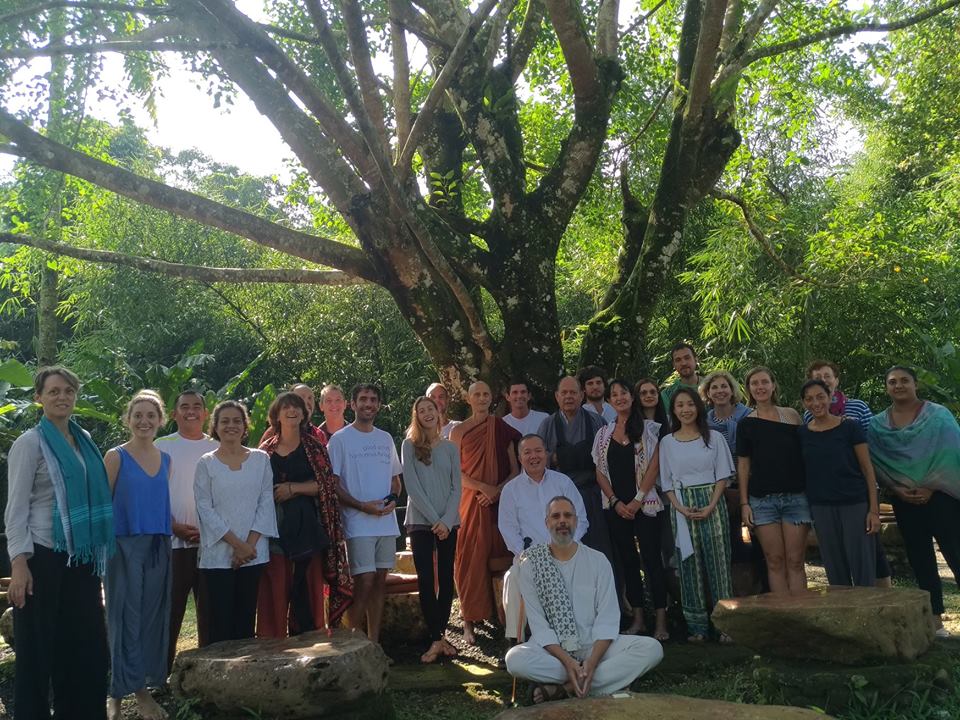
Michael Schueber in front of Merta Ada with Moneyya behind on the left and DC on the right
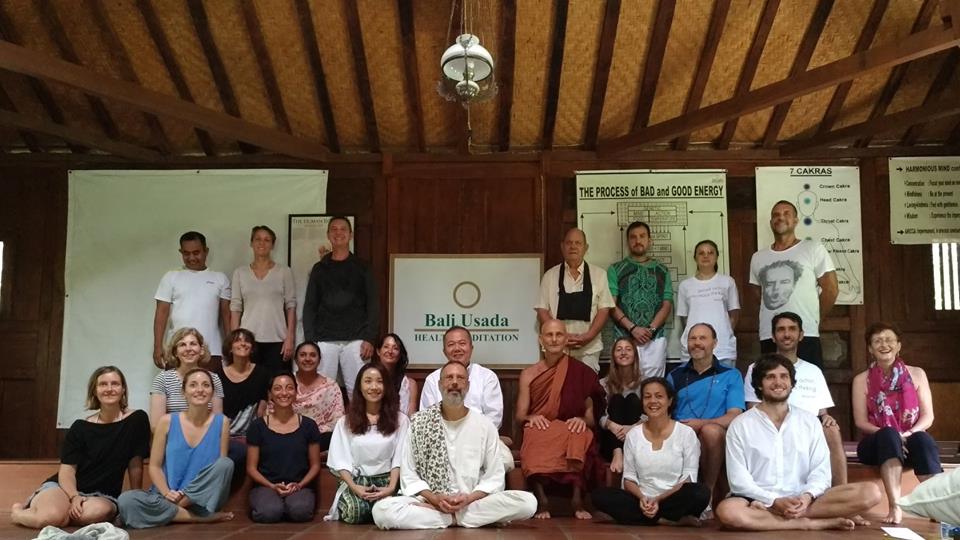
In the meditation hall - four had left the night before.
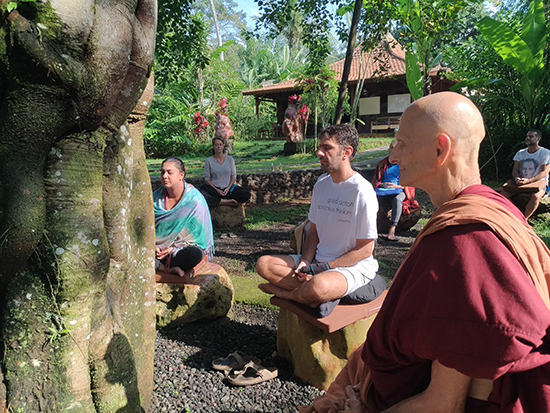
Moneyya at the Bo tree
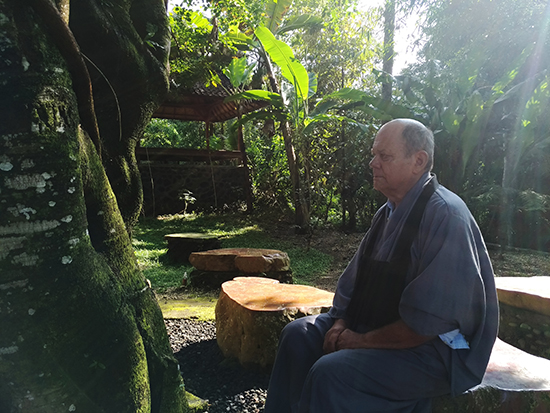
DC at the Bo tree
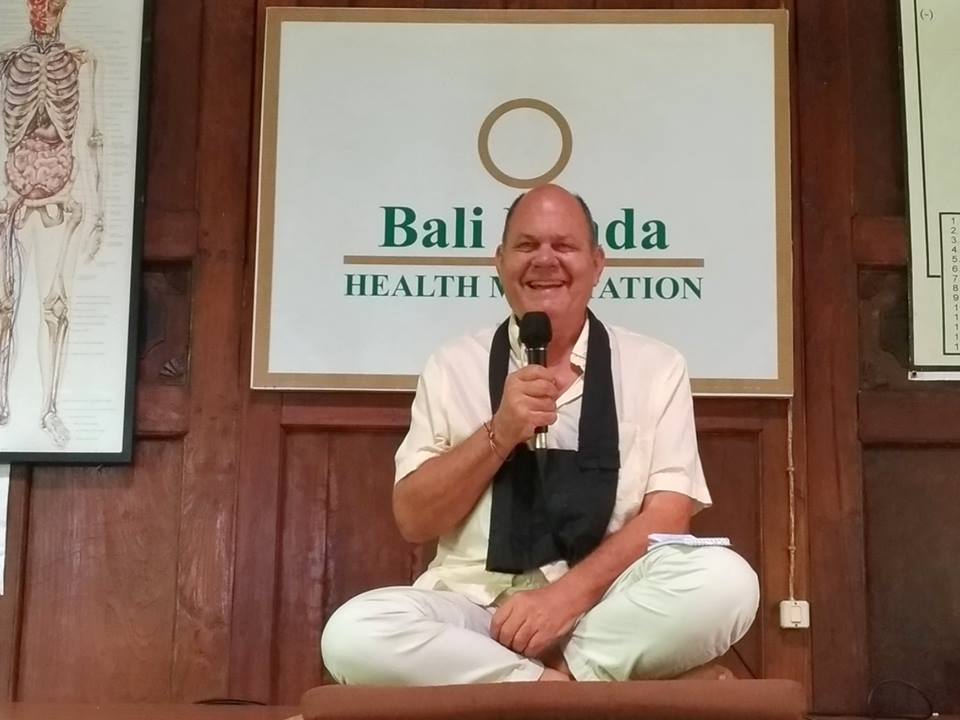
DC doing a ten minute sharing at the end of the retreat.
|